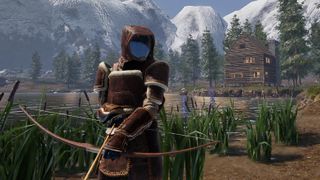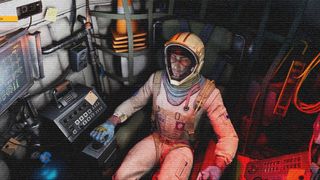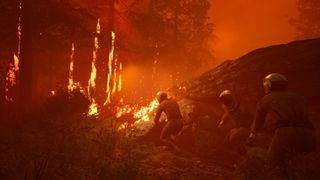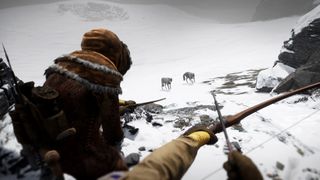Starting from scratch after every mission in Icarus isn't nearly the grind I expected
I worried the session-based survival system might be a repetitive drag, but it's really not.

I had a couple of concerns going into Icarus, the new survival game from DayZ creator Dean Hall and founder of dev studio RocketWerkz. Most of my worries were due to the session-based nature of the game. Rather than just playing on a persistent map like in most survival games, where you build permanent bases and keep tools, weapons, and gear for as long as you want, players in Icarus land in a drop pod to complete missions (called prospects) and before the timer on those missions is up they have to blast off the planet and return to space. Anything they've built, crafted, or gathered (except for exotic minerals) is left behind on the planet and gone forever.
To me, that sounded like a repetitive drag. Every time I finish a mission I've lost everything I've been working on for hours, or even days? I build a sweet base and cram it full of crafting benches and resources, and then it's all gone and I start over? It sounded like a Rust server wipe, but for every single mission.
But about 15 hours into Icarus, I've mostly changed my mind about the session-based system. It's not nearly as repetitive as I expected, though it's not as dramatic as I thought it would be, either.

First of all, these prospect sessions are long. Really long. The shortest prospect I've seen lasts three days. That's three real-world, realtime days. The longest is 29 days. That's a literal month to complete the prospect.
In one respect, the length of the prospects is a bit of a disappointment. When I think of session-based games I imagine something like Escape From Tarkov, where in an hour-long session the ticking clock provides a real sense of urgency and there's often a mad dash near the end of each mission to get out in time. That may wind up happening occasionally in Icarus, where players will wait to the very last minute to get back in their drop pods and return to space, but the sessions in Icarus are so long it seems unlikely it'll be common. It's hard to imagine racing against the clock when the clock is set for a solid month.
But I'd happily trade that drama for a more leisurely experience, and I'm finding Icarus to be pretty comfy. With the exception of the first couple days of my first real mission, where I was desperately grinding XP to unlock crafting blueprints, I'm finding a lot of my time in Icarus genuinely relaxing. There are plenty of oh-shit moments, like when lightning sets my house on fire, when a bear romps out of the trees at me, when cave worms pop up and spit poison in my face, and then there was the time I broke my leg falling off a cliff with a bear, a wolf, and a boar all in close proximity during a lightning storm and I didn't have the resources to craft a splint. It was a tense five minutes of slowly crabwalking to safety while trees went up in flames all around me.
Otherwise, the generous mission clock means I can take my damn time, spend entire days just gathering, cooking, setting up my base, and stocking up on everything I need for when I have to leave my base and actually complete my objectives. That's what I look for in a survival game—I enjoy tough scrapes and tense moments, but it's nice to have time to enjoy a bit of comfortable living and not constantly be hanging on by my fingernails.
The biggest gaming news, reviews and hardware deals
Keep up to date with the most important stories and the best deals, as picked by the PC Gamer team.

My other concern, about the repetitive nature of starting over for each mission, is pretty much gone, too. After the early grind of levelling up, unlocking new blueprints, and building everything, starting over on my next mission was nowhere as severe as I expected. What took me several in-game days to accomplish on my first mission I finished before sundown on the first day of my next mission. I was genuinely surprised at how quickly I was able to build a base and start stocking it with supplies and crafting benches. On my third mission it took me even less time. It didn't feel like a grind at all.
What helps is that there's a wide selection of talents to choose from that can make your character more efficient at harvesting resources and need less oxygen, food, and water to survive, which makes the entire process much easier and quicker. The first time I had to leave my house full of stuff behind I felt genuinely unhappy about it. All my crafting stations, gone. All that ore, wasted! All that venison, uneaten!
The next time I left the planet I didn't even give a thought to what I left behind. I know I'll land on my next prospect and be up and running again in no time.
Another help is that completing missions earns me a bit of space currency, which I can spend buying blueprints and crafting items on the space station to bring down to the planet with me. I haven't earned much yet, but I have a slightly better spacesuit and a proper knife that's better than the stone or bone knives I can craft on the planet (though not as good as the iron knife I can make once I've got a furnace and some ore). When I've got a few more metal tools and weapons unlocked in the space station, like an axe and pick and a higher quality knife, I expect starting from scratch on new missions will be even easier. The tools you craft in space can also be shared amongst your characters, so if I create a second astronaut they won't need to begin completely from scratch.

And even as I'm finding the missions themselves a little underwhelming (go to this place, do a thing, repeat in a few other places) I'm enjoying the survival systems a lot. Each new device I unlock that makes my life easier feels satisfying, like the oxite dissolver that lets me fill a small tank with oxygen, the textile bench where I can craft armor, the cooking station where I can take a break from eating wolf meat and create meals with two ingredients instead of just one. As long as I never let the mission timer expire before I get back to my drop pod, I'll keep adding talents until my character is a well-tuned survival machine.
I'm enjoying my time with Icarus a lot. The session-based system, at least 15 hours in, doesn't feel punishing or overly repetitive. Maybe it's not as dramatic or novel as I thought it would be, either, and it doesn't shake up the survival genre like I thought it might, but for now I'm pretty happy with that tradeoff.

Chris started playing PC games in the 1980s, started writing about them in the early 2000s, and (finally) started getting paid to write about them in the late 2000s. Following a few years as a regular freelancer, PC Gamer hired him in 2014, probably so he'd stop emailing them asking for more work. Chris has a love-hate relationship with survival games and an unhealthy fascination with the inner lives of NPCs. He's also a fan of offbeat simulation games, mods, and ignoring storylines in RPGs so he can make up his own.
Most Popular


